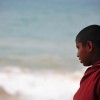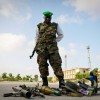News headlines in 2014
U.S. Twists Arms to Help Defeat Resolution on Palestine
- Inter Press Service

UNITED NATIONS, Dec 31 (IPS) - The United States re-asserted its political and economic clout - and its ability to twist arms and perhaps metaphorically break kneecaps - when it successfully lobbied to help defeat a crucial Security Council resolution on the future of Palestine this week.
Guantánamo Paradoxes Tested in Uruguay
- Inter Press Service

MONTEVIDEO, Dec 31 (IPS) - In the summery afternoon of a beachside neighbourhood not far from the Uruguayan capital, nothing could sound more unusual than the Muslim call to prayer chanted by Tunisian Abdul Bin Mohammed Ourgy, a few days after being freed from the United States military prison in Guantánamo, Cuba.
Sri Lanka Still in Search of a Comprehensive Disaster Management Plan
- Inter Press Service

KALMUNAI, Sri Lanka, Dec 31 (IPS) - About six months after a massive tsunami slammed the island nation of Sri Lanka on Dec. 26, 2004, large plumes of smoke could be frequently seen snaking skywards from the beach near the village of Sainathimaruthu, just east of Kalmunai town, about 300 km from the capital, Colombo.
OPINION: Understanding Education for Global Citizenship
- Inter Press Service

AHMEDABAD, India, Dec 30 (IPS) - Education for Sustainable Development (ESD) brings together concerns about the environment, economic development and social aspects. Since 1972, when the first U.N. Conference on the Human Environment was held in Stockholm, Sweden, there has been increasing awareness of the intricate link between conserving the environment and human development.
OPINION: We Have So Much to Learn From Cuba
- Inter Press Service

WHITE PLAINS, New York, Dec 30 (IPS) - Earlier this month, President Barack Obama announced the restoration of diplomatic relations with Cuba after more than five decades of a misguided policy which my uncle, John F. Kennedy, and my father, Robert F. Kennedy, had been responsible for enforcing after the U.S. embargo against the country was first implemented in October 1960 by the Eisenhower administration.
Small Grants for Big Solutions in Northeast Argentina
- Inter Press Service

BONPLAND, Argentina, Dec 26 (IPS) - Summers in northeast Argentina are hot and humid. At siesta time, the people of this rural municipality like to drink "tereré" (cold yerba mate), which until now they had problems preparing because of lack of clean water or electricity. But sometimes small donations can make a big dent in inequality.
Andrés Ortigoza, who lives in one of the villages in Bonpland, proudly shows off his simple new solar panel, which heats up an electric shower. In wintertime, tereré is replaced by hot yerba mate - a caffeinated herbal brew popular in Argentina and neighbouring countries - and taking a cold shower is not easy even for toughened gauchos (the cowboys of the Southern Cone countries) like him.
"We used to wash up with cold water, it was tough in winter….or we'd heat the water with firewood," he told IPS.
Picada Norte, where Ortigoza lives, was not connected to the power grid until 2010. But service is still patchy and is expensive for local families.
The installation of solar water heaters is one of the projects financed in Bonpland by the Global Environment Facility's (GEF) Small Grants Programme (SGP).
With its non-repayable grants of up to 50,000 dollars, the SGP has shown how small community initiatives have a positive impact on global environmental problems.
The expansion of forestry activity – mainly aimed at providing raw material for the pulp and paper industry – and the use of firewood as a source of energy are driving deforestation in the jungle in the province of Misiones, which accounts for fully half of Argentina's biodiversity.
The area forms part of the eco-region of the Parana basin tropical moist forest, which takes a different name in each country that shares it: Brazil, Paraguay and Argentina.
"At an international level, talking about these three countries, there were 80 million hectares around 1950, of which only four million hectares of forest are still standing today, and of them, 1.5 million are in Misiones," Juan Manuel Díaz, the provincial sub-secretary of ecology, told IPS.
"Our province covers three million hectares and practically half of that is Parana jungle," he said.
According to Ricardo Hunghanns, president of the Tabá Isiriri-Pueblos del Arroyo Association, 45 percent of productive land in Misiones is currently used by the forestry industry, which since the 1990s has changed the traditional distribution of land and modified the provincial economy.
"This has radically transformed the structure of agriculture in the province, where the paper industry rather than agriculture now represents 80 percent of GDP," the head of the organisation, which is involved in two SGP projects, told IPS.
The main aim of his association, he said, "is to strengthen the social economy, from the perspective of the inclusion and productive development of our communities."
For Hunghanns "it is essential to develop projects that diversify agricultural activity, above all to make it possible for those who have been expelled from their own land because their farms are too small, to return, as part of associations."
In Bonpland, the association is trying to do that through the projects financed by the SGP. But it first has to work out basic questions of subsistence.
Sara Keller suffered from not having water for 45 years. Every day she went to the nearest stream, one km from her village, to haul back 20-litre buckets of water, whether she was pregnant or carrying one of her six children. Calculating the total, she walked over 20,000 km in her life, to fetch water.
But now the 52-year-old married mother of six and grandmother of five, who lives in the village of Campiñas, has running water in her home, thanks to a simple five-km pipe financed by another SGP initiative.
"I really suffered not having water, carrying it from far away in the dry season," Keller, who now has free time to care for her vegetable garden, sew and even rest, told IPS.
One of the goals of all SGP projects is to include a gender perspective.
Women are often reluctant to take part in meetings because, due to cultural questions, they don't like to express opinions in front of their husbands, said Hunghanns. But, he pointed out, it is women who establish the priorities for the projects.
That was the case of the project that replaced latrines with toilets. Soledad Olivera, 18, whose husband is a rural worker employed in the extraction of sap or resin, and who has a two-year-old son and is expecting her second child, is happy with the new bathroom in her house in Picada Norte, which replaced a "dirty, smelly latrine".
"It's so nice," she says with a big smile on her face as she looks at the bathroom, complete with a toilet, electric shower, and, especially, running water.
The SGP, implemented by the United Nations Development Programme (UNDP), is financing 20 projects in Misiones, which also include the care of water sources, sustainable agricultural development, ecotourism activities with Guaraní indigenous communities, waste management and the production of medicinal herbs.
"The term ‘small donations' isn't the best. Because it's a commitment between two sides. We contribute something, and so do the community and the grassroots organisations," said René Mauricio Valdés, the UNDP representative in Argentina.
Poverty and Fear Still Rankle, Ten Years After the Tsunami
- Inter Press Service

COLOMBO, Dec 26 (IPS) - It took just 30 minutes for the killer waves to leave 350,000 dead and half a million displaced. Less than one hour for 100,000 houses to be destroyed and 200,000 people to be stripped of their livelihoods.
Pakistan’s Return to Death Penalty Contravenes International Treaties
- Inter Press Service

PESHAWAR, Dic 24 (IPS) - Pakistan's announcement that it has lifted the moratorium on the death penalty in response to the Dec. 16 attack on the Army Public School and College in Peshawar continues to draw severe criticism from human rights groups, which say that this contravenes international treaties signed by Pakistan.
For Zimbabweans, Universal Education May be an Unattainable Goal
- Inter Press Service

HARARE, Dic 24 (IPS) - Zimbabwe boasts of one of the highest rates of literacy across Africa but, but without free primary education, achieving universal primary education here may remain a pipe dream, educationists say.
Years in the Making, Arms Trade Treaty Enters into Force
- Inter Press Service

UNITED NATIONS, Dic 24 (IPS) - A new Arms Trade Treaty (ATT) beginning on Dec. 24 represents a historic moment in global efforts to keep weapons proliferation in check.



